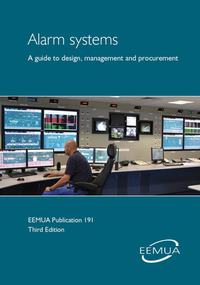Alarm Systems Management - Aligned with EEMUA 191
Alarm Systems Management is a concise one-day training course aimed at helping prevent accidents similar to the explosion and fires at the Milford Haven refinery in the UK in 1994. This serious incident injured twenty six people, caused damage of the order of €50 million and resulted in the loss of a large amount of production.
Description
The tuition sessions provide simple and practical guidance on how to recognise and deal with typical human-factor problems involving alarm systems. Its scope covers many sectors, including the energy, process, transport and utilities industries.
 The tuition is aligned with EEMUA 191, the globally accepted and leading guide to good practice for all aspects of alarm systems, issued by the EEMUA (Engineering Equipment and Materials Users Association). This publication, developed by users of alarm systems with input from the HSE, gives comprehensive guidance on design, management and procurement.
The tuition is aligned with EEMUA 191, the globally accepted and leading guide to good practice for all aspects of alarm systems, issued by the EEMUA (Engineering Equipment and Materials Users Association). This publication, developed by users of alarm systems with input from the HSE, gives comprehensive guidance on design, management and procurement.
Participants can purchase a copy of the book recommended by the HSE – “Alarm Systems, A Guide to Design, Management and Procurement, EEMUA Publication No. 191” from the EEMUA shop here >>
Leading Tutor
Dr. Andy Brazier
Risk Consultant Specialising in Human Factors and Process Safety (AB Risk) and Wilde Risk Management Associate
Andy is a key associate for Wilde Analysis ltd. He has a chemical engineering degree, PhD and vast experience having worked as a consultant since 1996. Andy’s consultnancy company AB Risk Limited was set up in 2005 and has been accepted as a Registered Consultancy by the Institute of Ergonomics and Human Factors (IEHF).
Using his combination of engineering background and consultancy skills Andy assists companies to manage their risks in a sensible and cost-effective way. He works mainly in hazardous industries including the oil, gas, chemical, power and steel manufacture. With a few projects in other industries including air traffic control, food and drink, financial and waste.
Andy’s combination of academic learning and practical experience; engineering and human factors knowledge has enabled him to provide helpful and effective risk management recommendations to a range of clients in the UK, Europe and Middle East, including; Shell, BP, Centrica, Scottish and Southern Energy, Flogas, Millennium Chemicals, Tata Steel, Corus, Ensus, Lucite, Ineos, Maersk, Petrofac, Siemens, Huntsman, Veolia, Pfizer, Dragon LNG, Novartis, ConocoPhilips, Dow Corning, Kemira, OMV, Qatar Gas, Petroleum Development Oman (PDO), Kuwait National Petroleum Company (KNPC), Abu Dhabi National Oil Company (ADNOC) and Saudi Aramco. Also with projects deployed from the Arctic circle through to Australia.
On top of Andy’s learning & practical experiences, Andy has completed offshore survival training including Basic Offshore Safety Induction & Emergency Training (BOSIET) & Minimum Industry Safety Training (MIST).
As a member of the editorial panel for the Loss Prevention Bulletin Andy regularly writes articles for the publication.
Andy is also the primary author of the recently published third edition of EEMUA 201 – Control Rooms: A guide to their specification, design, commissioning, and operation.
Who Should Attend?
Managers, designers, supervisors and operators.
Duration
1 Day
The course commences at 9:00am and finishes at approximately 5:00pm.
Agenda
Sessions
Introduction
- How the HSE Expects Alarm Systems to be Managed
- Alarm System Management Policy
- Safety Case
Core Principles of Alarm System Management
- Philosophy of Alarm System Management
Alarm System Design Overview
- Human Factors
- Structuring and Partitioning of Alarms
- Limits on claims for Safety Integrity Level (SIL)
Design Process
- Where do Alarms Come From?
- Safety, Environmental or Economic Alarms
- Qualitative Risk Assessment
- Choice of Alarm Priorities
- Alarm Settings
Procurement of Alarm Systems
- Investment Appraisal
- Cost of Poor Alarms Performance
- Specifications to Ensure Usability
Measuring Performance
- Syndicate Exercises and Surveys
- Performance Metrics
- Audits and Reviews
Managing an Improvement Programme
- Dealing with Unwanted Alarms
- Logical Processing of Alarms
- Repeating and Fleeting Alarms
HAZOP and Alarms
- Alarms in Context
- Preparations and Boundaries
- Operator Interface
- Alarm Suppression Hazard Study
Wrap Up
- Roadmaps
- Final Questions